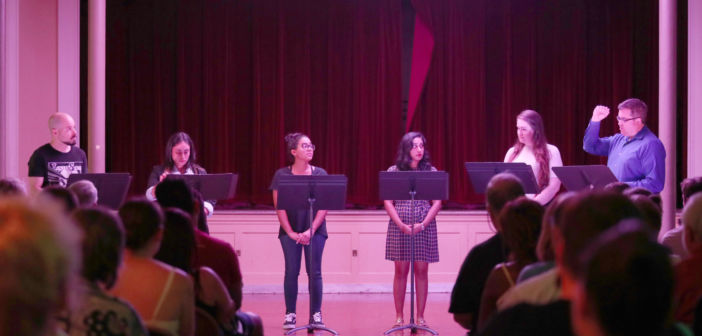Out of the 2.3 million incarcerated people in the United States, not many get to have their stories told.
Two Lehigh students are helping to change that.
Kalyani Singh, ’18G, and Henry Fisher, ’19, spent the summer raising awareness for issues in the criminal justice system through a self-made Mountaintop Project, “Beyond Bars: Redesigning Criminal Justice through Theater and Social Change.”
The summer project culminated in a performance as a part of Allentown Public Theater’s “Voices of Conscience” series.
Singh and Fisher met while doing research with professors in political science and psychology. They quickly discovered they had a shared interest in the criminal justice system.
The pair was told they should find a creative pathway to make their proposed project on criminal justice more appealing. With Singh’s background in theater and the emotional stories they wanted to tell, putting on a show seemed like a good solution.
“When you’re dealing with people that have been incarcerated, it touches a lot of different people’s lives from different backgrounds,” Fisher said. “It should be an important issue for everybody.”
The two collaborated on every step of the process – from research to writing the script for the show. Over the course of 10 weeks, they interviewed 14 formerly incarcerated people, former and current jail administrators and others who said they have been affected by the criminal justice system.
“A team of two was great for this because we have different backgrounds and different points of view, but we are still on a very similar wavelength, which works well for us and we can easily bounce ideas off each other,” Singh said.
When it came to finding advisers for their project, Singh and Fisher said they needed someone with a strong background in theater. Bill Whitney, an administrative director for the Office of the Vice Provost for Creative Inquiry and an adjunct theater professor, was their preferred choice. Karen Beck Pooley, a professor of political science and the director of the environmental policy design program, and Holona Ochs, a professor of political science, also served as faculty advisers.
Whitney, who has always had a passion for social justice theater, was excited to participate in and mentor Singh and Fisher throughout the course of the project. He took a hands-off approach, checking in with the students weekly and working through drafts of the script.
“There are a thousand different ways you can approach social justice theater, so you have to decide what your approach is and what you’re trying to accomplish,” Whitney said. “That was the biggest struggle that they had.”
The play featured five actors who read the interviewees’ stories and a narrator to help facilitate the show. Singh and Whitney performed, while Fisher recorded it from the audience.
After the readings, there was a feedback session. Questions and comments came from people with a wide range of experience in the criminal justice system — some even shared their own stories.
Although they did not have rigid expectations for the performance, all three said it went better than they could have imagined and considered it a success.
The team hopes the project will continue with more involvement from Lehigh students and faculty, and more performances for the campus and community to attend. Singh and Fisher plan to conduct more interviews and develop new aspects to the performance this semester.
“The work doesn’t end here,” Singh said. “It’s just the launching pad for the future.”






Comment policy
Comments posted to The Brown and White website are reviewed by a moderator before being approved. Incendiary speech or harassing language, including comments targeted at individuals, may be deemed unacceptable and not published. Spam and other soliciting will also be declined.
The Brown and White also reserves the right to not publish entirely anonymous comments.